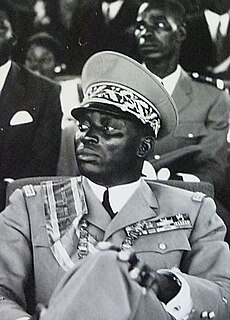The history of Togo can be traced to archaeological finds which indicate that ancient local tribes were able to produce pottery and process iron. During the period from the 11th century to the 16th century, the Ewé, the Mina, the Gun, and various other tribes entered the region. Most of them settled in coastal areas. The Portuguese arrived in the late 15th century, followed by other European powers. Until the 19th century, the coastal region was a major slave trade centre, earning Togo and the surrounding region the name "The Slave Coast".

Politics of Togo takes place in a framework of a presidential republic, whereby the President of Togo is both head of state and head of government. Executive power is exercised by the government. Legislative power is vested in both the government and parliament. Since independence the party system is dominated by the authoritarian Rally for the Togolese People.

Gnassingbé Eyadéma was the President of Togo from 1967 until his death in 2005. He participated in two successful military coups, in January 1963 and January 1967, and became President on April 14, 1967.

Elections in Togo take place within the framework of a presidential system. Both the President and the National Assembly are directly elected by voters. The country is a one party dominant state with the Union for the Republic in power.

Presidential elections were held in Togo on 24 April 2005, following the death in office of long-time president Gnassingbé Eyadéma. The main candidates were Eyadéma's son, Faure Gnassingbé, and opposition leader Emmanuel Bob-Akitani. The elections and the preceding period were marked by violence, with many people reported killed in various incidents. According to the official results, Gnassingbé won the election, taking slightly more than 60% of the vote. Violence flared in the capital Lomé after the results were announced, and thousands fled into neighboring countries.
Fambaré Ouattara Natchaba is a Togolese politician. He was the President of the National Assembly of Togo from 2000 to 2005. He is a prominent member of the ruling Rally of the Togolese People (RPT) and is a member of the Pan-African Parliament representing Togo.

Nicolas Grunitzky was the second president of Togo and its third head of state. He was President from 1963 to 1967. Grunitzky was Prime Minister of Togo from 1956 to 1958 under the French Colonial loi cadre system, which created a limited "national" government in their colonial possessions. He was elected Prime Minister of Togo —still under French administration— in 1956. Following the 1963 coup which killed his nationalist political rival Sylvanus Olympio, Grunitzky was chosen by the military committee of coup leaders to be Togo's second President.
Gilchrist Olympio is a Togolese politician who was a long-time opponent of the regime of Gnassingbe Eyadema and was President of the Union of Forces for Change (UFC), Togo's main opposition party from the 1990s til 2013. Olympio is the son of Sylvanus Olympio, Togo's first President, who was assassinated in a 1963 coup. He is now an ally of the current regime of Faure Gnassingbe, the son of the late President.
The Rally of the Togolese People was the ruling political party in Togo from 1969 to 2012. It was founded by President Gnassingbé Eyadéma and headed by his son, President Faure Gnassingbé, after the former's death in 2005. Faure Gnassingbé replaced the RPT with a new ruling party, the Union for the Republic (UNIR), in April 2012, dissolving the RPT.
Joseph Kokou Koffigoh is a Togolese politician, human rights activist, and a poet who served as Prime Minister of Togo from 27 August 1991 to 25 April 1994. Elected as Prime Minister by the opposition-dominated National Conference in 1991, Koffigoh was given full executive powers and tasked with overseeing a transition to multiparty elections. Beginning in December 1991, however, President Gnassingbé Eyadéma increasingly reasserted his authority at Koffigoh's expense. Although Koffigoh remained in office, the opposition eventually abandoned him, feeling he had become too cooperative with Eyadéma.
Yawovi Madji Agboyibo is a Togolese politician. He served as Prime Minister of Togo from September 2006 to December 2007 and was National President of the Action Committee for Renewal (CAR), an opposition political party, from 1991 to 2008. He is the Honorary President of the CAR.

Presidential elections were held in Togo on 21 June 1998. Incumbent President Gnassingbé Eyadéma, in power since 1967, was re-elected with 52.1% of the vote according to official results. The opposition disputed this and claimed that Gilchrist Olympio of the Union of the Forces of Change (UFC) had won.
March 2000 passed without presidential action. New legislative elections were ultimately rescheduled for October 2001. Because of funding problems and disagreements between the government and opposition, the elections were again delayed, this time until March 2002.
Dama Dramani is a Togolese politician who has been President of the National Assembly of Togo since 2013. He was Secretary-General of the Rally of the Togolese People (RPT), the ruling party, from 2003 to 2006, and following the 2007 parliamentary election he was President of the RPT Parliamentary Group in the National Assembly.

General elections were held in Togo on 30 December 1979, alongside a constitutional referendum that confirmed the country's status as a one-party state. Gnassingbé Eyadéma, who had led a coup in 1967, was elected President unopposed, whilst the Rally of the Togolese People won all 67 seats in the National Assembly as its list of 67 candidates was approved by voters. Voter turnout was reported to be 99.3% in the parliamentary election and 99.4% in the presidential election.

Protests against Faure Gnassingbé have occurred throughout Togo starting when Faure Gnassingbé assumed power after the death of his father Gnassingbé Eyadéma in February 2005.

The 1967 Togolese coup d'état was a bloodless military coup that occurred in the West African country of Togo on 13 January 1967. The leader of the coup, Lieutenant Colonel Étienne Eyadéma ousted Togo's second President, Nicolas Grunitzky, whom he essentially brought to power following the 1963 coup d'état.















